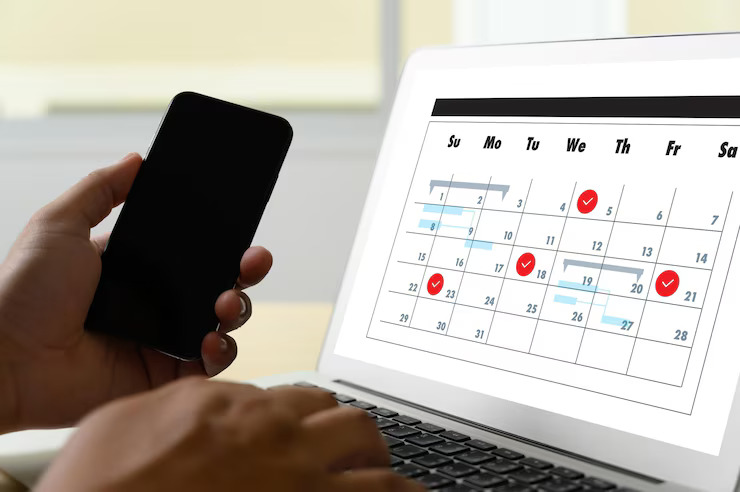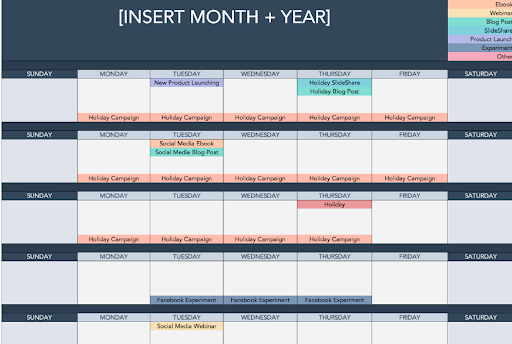5 June 2024 |
By - Sudha Mariappan

Managing social media without a content calendar is nothing but a waste in this digitally advanced era. It is like baking a cake but without a recipe, you won’t have any guidance at all.
You will never know the results in advance. For example, when you bake a cake without any recipe, either you’ll end up with a tasty cake or a tasteless mess.
Similarly, without a proper content calendar, it is impossible to predict what your results will be. Will your business gain followers? Will you lose some of your views?
No matter where you stand in the market, be it a small business owner, a marketer, or an influencer, you need to have a well-planned social media content calendar.
It is not only essential for keeping your audience engaged, but also for converting them into loyal customers.
You just need to know the knick-knacks of creating a successful content calendar.
So let’s see as a business, how you can master your social media content calendar game.
Why exactly do you Need a Social Media Content Calendar?
The burning question is, Why do you even need a social media content calendar?
When you are an individual, or a team managing a social media account or multiple social media accounts, it is necessary to have a social media content calendar.
Consistently posting on different mediums of platforms, such as LinkedIn, Instagram, Twitter, and more, will lead to energy drain, and you might feel unmotivated. But with a social media content calendar, you can manage multiple versions of your content strategy by planning it ahead of time.
Without a plan, your content can become inconsistent. It can become irrelevant and ineffective.
The social media content calendar is a map for your social media business. Depending on the date and time, you can schedule which type of content to post, and you’ll mark it in your social media calendar. You can check out this content calender template for reference. The best part is that you can create content 30 days or even 365 days in advance.
It will help you to:
Maintain smooth Consistency: Regular posting keeps your brand at the top of your audience's mind.
Plan your goals Ahead: You can align your content with holidays, events, and your upcoming marketing campaigns.
Save your Time: Scheduling content can free up your time for other important tasks, greatly reducing your workload.
Analyze your social media Performance: A calendar helps track what works and what doesn’t, enabling you to tweak your strategy according to those changes.
Setting Up Your Content Calendar:
Now that you're convinced of its importance, let’s get to the ‘how to’ process.
Here’s a step-by-step guide to get you started:
Get to know where you social media stands:
A social media audit is essential if you need to know where you stand. You might have one account that has been inactive for a while but went unnoticed. Check here if you want to know how to conduct a social media audit.
A social media audit refers to a step by step examination of your firm’s social presence, consisting of performance indices and prospects for future growth and enhancement of accounts.
Therefore, audits are an essential part of social media that indicate how your company’s objectives are affected by its social presence, and offer customer care, which is high quality and requires constant interaction with the audience.
Choose Your Platforms:
Not every social media platform is the same. Therefore, you need to focus your efforts on the ones that match your objectives and where your target audience is most engaged.
Instagram might be more suitable for visual content, while LinkedIn could be best for business relations and professional settings, and finally Twitter for more discussion-like platforms. So choose them depending on your brand's nature.
Decide how frequently you need to post:
Different platforms need various posting frequencies. For example, to remain relevant on Twitter, you might post several pieces of content a day, and when we’re talking about Instagram, posting once a day is enough. But avoid flooding users and still keep up the number of your posts.
Make sure your calendar includes:
Your calendar should include essential details for each post: the date and time of posting, platform, type of content (image, video, link, etc.), Infographics are also a great option for showcasing your expertise and information through informative images. Read our recent blog on how to make an attractive infographic. caption, hashtags, any links, and visuals. Also, try to consider including a column for notes or additional context to keep track of ideas and strategies.
Use a social media calendar template:
Make use of those ready-made templates to save time! Plenty of websites, such as HubSpot, offer free, customizable templates made especially for different types of businesses and content strategies.
Content calendar example:
A Social media calendar template would be what you need to plan and organize the content that you are going to share on your social media channels.
These templates usually have parts for each of the platforms that you decide to use, it contains monthly, yearly content with links of any media you will include in the post, as well as when and what time they have to be published.
Below is the Hubspot social media calendar, which is an excellent example of a monthly content with its goals and structure:

Benefits of having a social media calendar for your business:
Let’s see why creating and sticking to a social media content calendar is beneficial for your business:
Improve your business: With a social media calendar, you can easily visualize your content strategy and make sure a balanced mix of content types and themes is being used.
Make time for Creativity: You don't have to cram up doing all the work by yourself. Planning ahead of time with a social media calendar frees up your creative energy, it gives you time to develop more engaging and innovative content.
Allocate your Resources: Some important resources Keeping a social media content calendar helps you prioritize your resources more efficiently. You can effectively plan your work, concentrating on your resources and schedule when you're less busy.
Increased Engagement: When you have a timetable in your hands and post according to it, you increase your engagement with your audiences. Posting consistently will keep your audience more engaged and build more trust.
If you need any assistance in creating a social media content calendar, feel free to connect with us at info@ontogendigital.com. Subscribe to us for more blogs.